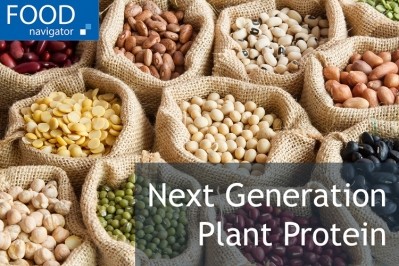Bubble burst? Researchers question long-term health and environmental effects of plant-based diet

The plant-based meat and dairy alternatives industry ‘revolution’ has been all but the talk of the town for the food industry in recent years, with its rapid growth mainly fuelled by its perceived benefits for health and the environment.
Making the switch to a plant-based diet was dubbed as ‘climate-friendly’ and carrying less ‘health risks’ as opposed to a conventional animal-based one by University of Otago researcher Jono Drew, who was part of a research team looking into the potential emissions and public health cost savings a population-level switch could bring, using New Zealand as a model.
"[As we] modelled dietary scenarios [that] became increasingly plant-based and therefore more climate-friendly, we found that associated population-level health gains and healthcare cost savings tended also to increase,” said Drew.
“A scenario that replaced all meat, seafood, eggs, and dairy products with plant-based alternatives, and that also required people to cut out all unnecessary household food waste, was found to offer the greatest benefit across all three of these parameters."
The study found that a population-level dietary shift could lead to diet-related emissions savings of up to 42% a year, up to 1.5 million quality-adjusted life-years (i.e. years of optimal health), and public health cost savings of up to NZ$20bn (US$12.9bn).
Following these findings, the researchers pushed for ‘national policy action’ in keeping with the promotion of switching to a plant-based diet.
That said, such a move would undoubtedly meet with opposition, as not everyone is on board with this train of thought. Other researchers have come forth, saying that such a switch could be equally, if not more, detrimental to human health and the environment as compared to conventional meat and dairy.
So this really begs the question – are plant-based alternatives really as beneficial as they seem?
Environment
The environmental benefits argument is one of the most commonly-used ones by plant-based diet supporters.
As the logic goes, an animal-based diet is highly environmentally unsustainable, especially when red meat is involved, due to cattle-rearing factors such as water use, pollution, and greenhouse gas (GHG) emissions – problems that would supposedly be solved by making the switch.
However, this argument may not be as clear cut as it first seems. According to nutrition scientist Dr Graeme Coles, consuming only plants will inevitably still lead to environmental pollution, albeit in a rather different way.
“Plant-based proteins have a much lower concentration of [essential amino acids] for which we consume protein [as compared to] animal protein,” said Dr Coles at a The Country dialogue.
“To get the same amount of [essential amino acids like] lysine out of a plant-based diet, you would have to consume [much] more protein as compared to an animal-based one. A lot of the nitrogen from that would eventually just go straight through and is excreted to the environment.
“This means [however much more protein you consume] will result in the same amount more of nitrogen, leading to more nitrous oxides, which are very potent GHGs.”
However, this argument has not been accepted by vegan proponents, calling Dr Cole ‘an advocate for the dairy industry’ and his claims ‘ludicrous’.
“[Dr Cole’s claims are] at odds with all the peer reviewed science. [Comprehensive] reviews in top journals confirm that the only way to feed a projected 11 billion people without further habitat destruction or pesticide use is if everyone adopted a plant-based diet,” said Dr Michael Morris on behalf of the The Vegan Society of Aotearoa New Zealand.
“There are far too many variables to determine if vegans do actually consume more nitrogen but even if we accept Dr Cole’s calculations at face value and assume that nitrous oxide emissions would increase [if] everyone became plant-based, the contribution this will make to greenhouse gas emissions is negligible.”
That said, no details were mentioned with regard to other concerns regarding the cultivation of plant-based crops for food, e.g. higher water usage and/or environmental acidification.
Health
The health benefits of a plant-based diet have also long been touted to be superior to an animal-based one – but again, little emphasis till date has been put on the potential cons.
A major example here is that of anti-nutritional factors, which are basically protective elements such as acids and enzyme inhibitors that plants have evolved over the years to defend themselves against being eaten.
In order to overcome the effects of this, the plant-based industry has developed various methods to process the plants and remove these factors, for example fermentation, thermal processing, pulverization, soaking and so on.
The issue with this is that such processing may not remove all the anti-nutritional factors – and attempts to completely remove these may result in different ones emerging instead or other as-yet-unknown side effects.
A 2019 Indian study into the health effects of plant-based milks stated that although the potential of the sector was ‘great’, anti-nutritional factors are still an industry challenge.
“[The] presence of some anti-nutritional factors, which may be naturally occurring or might develop during processing as a part of food, is one of the major issues faced by food processing industries in the commercialisation of [plant-based] products,” said the study authors.
Take the world’s currently most popular alternative milk, made from soy, as an example.
Soy milk is usually processed via fermentation, but the problem lies in that soy naturally contains high levels of isoflavone flavonoids which can convert into the hormone oestrogen. In large amounts, oestrogen has negative effects on the female reproductive system – and further fermentation can increase isoflavone concentration in the resulting soy milk.
Worse yet, plant-based meat alternatives, which are heavily processed, have also recently come under fire for containing large amounts of salt, which at high levels can increase blood pressure and the risk of cardiovascular disease.
A 2019 study conducted by the George Institute of Global Health found that meat-free bacon products in Australia, one of the most vegan-popular countries in the world, contained an average salt content of 2g per 100g – this amounts to 40% of World Health Organisation (WHO) population targets of 5g per day.
Falafels and meat-free sausages had 1.3g salt per 100g each, coming to some 25% of the recommended daily salt target.
“It’s concerning that, in nearly a decade, there has been no change to the salt levels in any of the meat alternative products we looked at, and that new products coming on to the market are so high in salt,” said study author Clare Farrand.
“There are no salt targets for meat alternatives [set by government], and this will need to be addressed.”
Separate research conducted by the United Kingdom’s Action on Salt health campaign group saw popular brands such as Tofurky’s and Tesco’s meat-free options also containing very high salt contents - 3.5g 3.2g per 100g respectively.
More recently, Quorn Quarter Pounder burger patties were noted by media outlets to contain 1.8g of salt per patty – more than a large McDonald’s fries at 1g salt per serve. Experts at the Nuffield Council of Bioethics have warned that the long-term health effects of meat alternatives have not yet been established.
“Terms used by manufacturers to describe meat alternatives that promote their environmental and animal welfare benefits, such as ‘clean’, ‘green’ and ‘slaughter-free’, might mean people overlook the health implications of these products,” added the council.
So what’s best?
A further consideration in making the switch is that discipline is very crucial in order to call the plant-based diet a thoroughly ‘healthy’ one, especially when a great deal of everyday dietary temptations are actually made from plants – think bingeing on chips and French fries.
Of course, this is not to say that a diet rich in cheese and red meats is the better option, but merely illustrates the point that without moderation and balance, neither option can be considered to be ‘healthy’.
“A balanced, diverse diet is the way to go,” said Dr Cole.
“The best thing to do is have a combination of plant-based and animal-based foods that give you the optimum dietary outcome.”
















